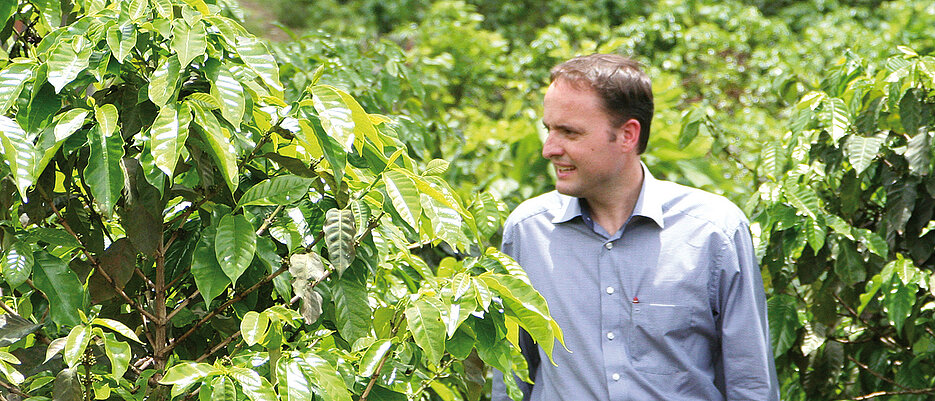From Würzburg into the world
12/31/2018A cup of coffee in Hawaii set the decisive course in his life. Today Alumnus Thomas Eckel is the managing director of a coffee roasting company. He advises students to look outside the box.
Which jobs do graduates from the University of Würzburg work in? To present different perspectives to students, Michaela Thiel, the director of the central alumni network, interviews selected alumni. This time it's Thomas Eckel's turn. The alumnus of the JMU in Würzburg studied Business Administration and is now managing director of a coffee roasting company with an associated coffee house in Murnau.
Mr. Eckel, what fascinates you about coffee? That's very broad. It starts on the coffee plantation. Life there has a different value. You can see how cheerful and happy people can be when they live in harmony with nature, away from the huge advertising and consumption machinery. And then, of course, there is the coffee itself, which fascinates me, especially the quality projects that we implement together with the coffee farmers.
What do you mean by that? There are over 800 aromas in the coffee bean. During the ten years that the Murnauer Kaffeerösterei has been in existence, I have observed that this variety of aromas is constantly increasing in intensity.
How do you explain this? This is because coffee farmers are expanding their knowledge and dare to play with different coffee varieties and preparation methods. There are pronounced fruity tones from raspberry to spicy notes like cinnamon. This is why roasting the beans is one of the most exciting processes, where a good roaster can turn a raw bean into a bean for pleasure. Discussions with customers in the coffee house are also an enrichment. Many of our guests are connoisseurs, thinkers, change agents.
How did you get to your current job after graduating? During my studies I was in Hawaii, among other places. There I drank really good coffee for the first time in my life. Nowhere in Würzburg did I find this quality again. So I quickly became a tea drinker, but I always missed the pleasure of Hawaii. By chance I got good coffee from Colombia. And then the coffee didn't let me go. I wanted to know more. Where does coffee come from, how do the aromas develop? I then trained as a coffee sommelier and coffee expert, and then I took the step into self-employment.
How can we imagine your everyday working life? Very varied! As the owner of a steadily growing roasting plant, I am constantly experiencing changes. However, my focus is still on quality assurance, from purchasing green coffee to roasting and serving. That's why I often meet with my roasters to make tastings, to check roasting profiles and to polish them, to test new coffees.
What advice would you give to students who would like to follow a similar path? I've heard often that what we learn at school or university we don't need afterwards, not even ten percent of it. You can't get very far with that attitude. My experience is that at university I didn't even learn ten percent of what I needed afterwards. So it was just the basis. My advice is therefore: You have to make room in your head for new and different things, look beyond your own nose, dare to think in completely different directions and above all try to understand worldwide connections!
What events from your studies do you particularly like to remember? There are many moments I like to remember. Most impressing were the professors who had their own opinions. Professor Bofinger, Professor Wenger, for example, or Professor Thome - I remember a lecture at the Chamber of Industry and Commerce, where he gave the representatives of the District Office a tongue-lashing and received thunderous applause for it.
Thank you very much for the interview.







